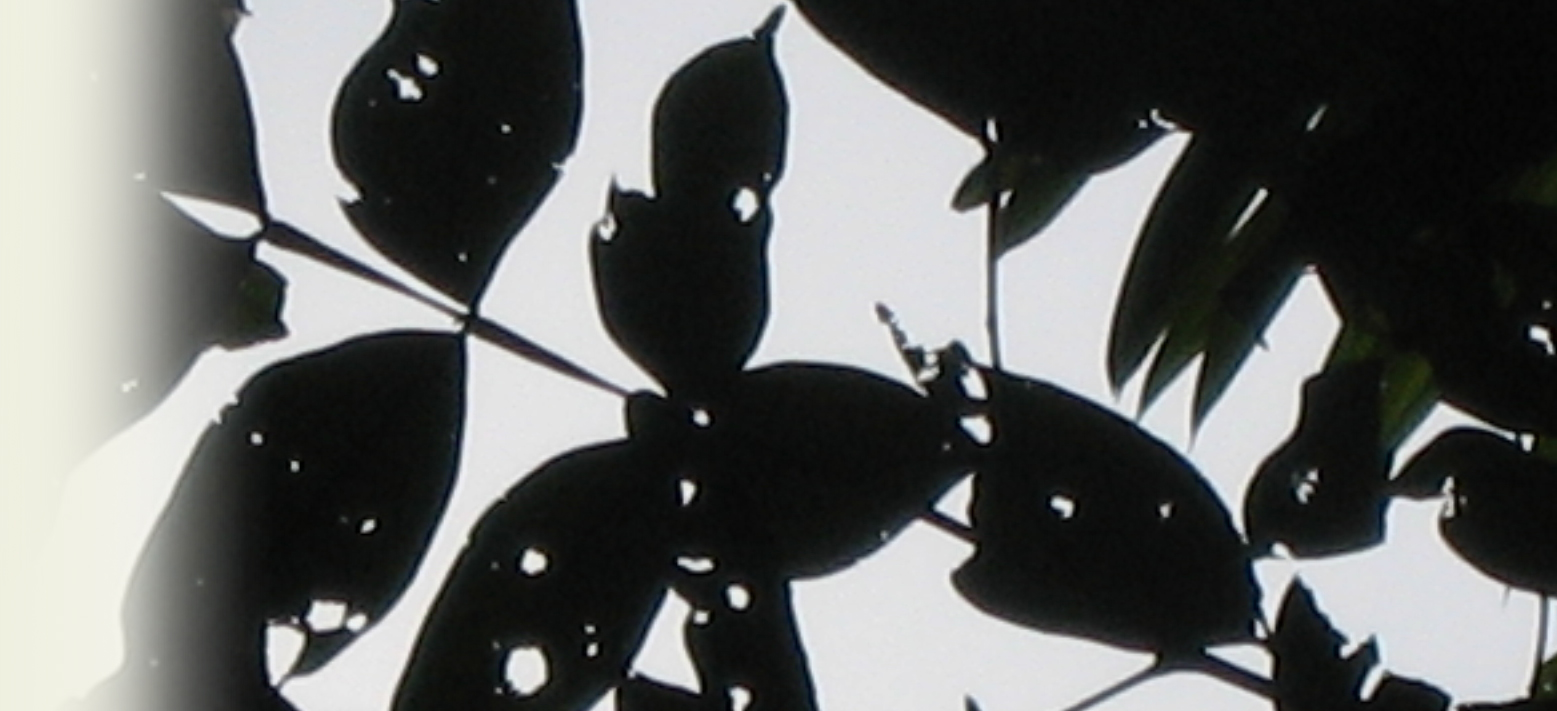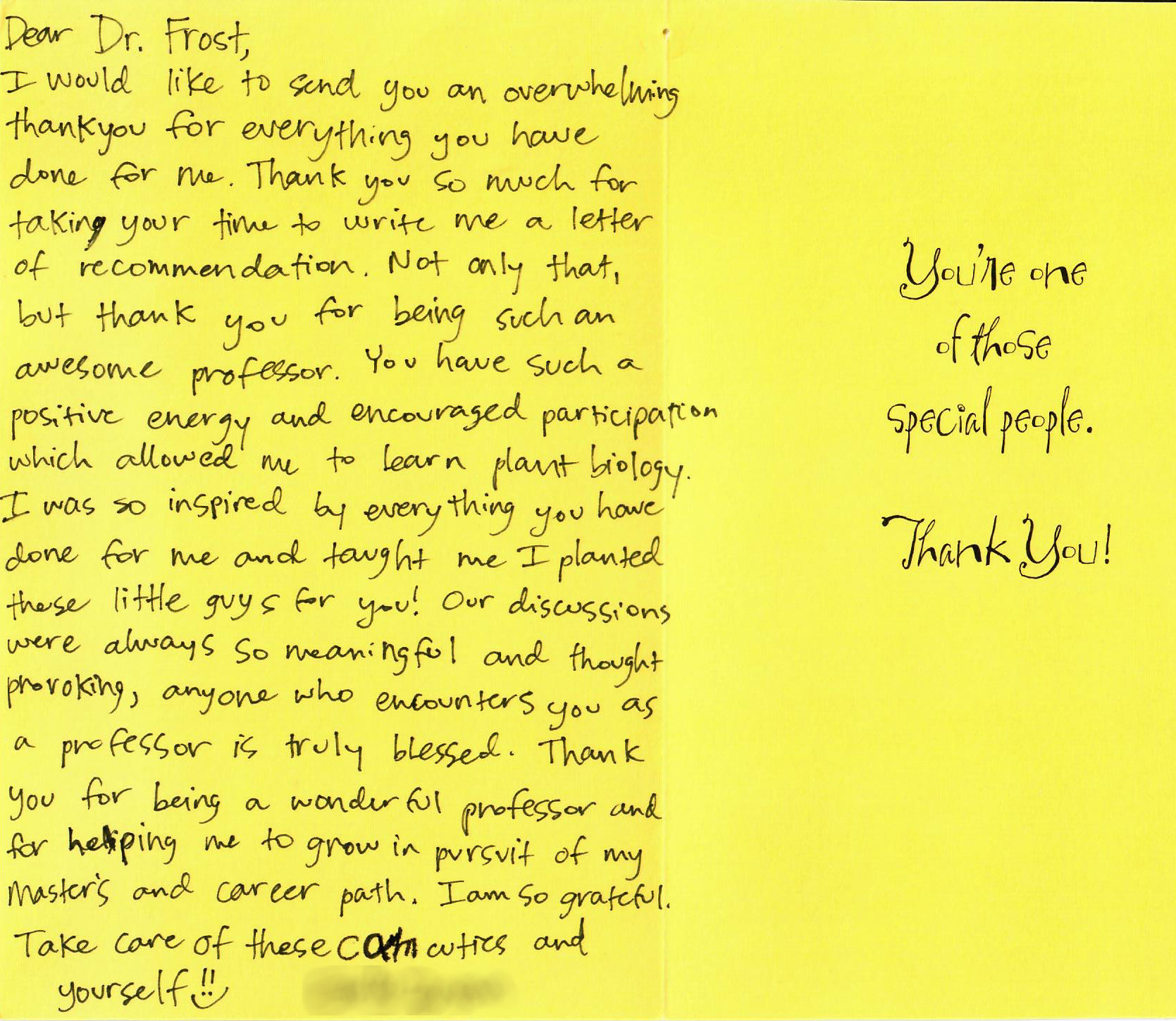The Frost Laboratory: Plant Integrative Biology and Chemical Ecology
General Expectations of All Scientists in the Frost Chemical Ecology Group
Being a scientist and working in an academic environment is a privilege. There are few, if any, other professions or endeavors where the core performance expectation is to expand the boundaries of human knowledge about our natural world. Science is a highly creative, and even artistic, endeavor. It is therefore our obligation to respect the opportunity we have as scientists and dedicate the effort and intellectual energy required to be successful. We also must recognize that we have an obligation to take our science seriously: there is no room in science, or in this lab group specifically, for mediocrity. We want to live and breathe the science that we are doing, and show the world the value of our science and the process of doing science.
Each of us must develop a passion for our research. Without passion, you will not engage your research question to the necessary level and will therefore likely not do great science. Passion will allow you to see the world through your research questions, and drive your enthusiasm and focus toward achieving a result: a scientific discovery. What discovery will you make? Passion will drive you to take ownership of your research question, and your personal investment will drive you toward success. We are judged by our scientific outputs, specifically our contributions to our collective knowledge through the communication of our scientific discoveries to the world. If we are not communicating our scientific discoveries, then we are not doing our jobs. This requires having the creative drive to develop novel research questions based within our existing knowledge (which means you MUST know the literature), and implementing the necessary experiments necessary to support or falsify the hypotheses that follow from your research question.
We work for results, not schedules. Scientific discoveries do not often occur on a particular work schedule. We do not work on schedules, but rather we work for results. This is one aspect of doing science that is unlike other professions. We are not judged by a particular schedule, but by the results we obtain and publish. While the technical aspects of doing science often require considerable time commitment and effort, our passion should drive our desire to achieve results.
Show up. While we are ultimately judged by our results, we will not achieve results without effort. So,show up. You are more likely to be involved in your own project the more you are around the lab and communicating with other lab members - sharing ideas, discussing your research, thinking about science and potential collaborations.
Happy scientists make productive scientists. This is a cliché, of course, but the point is that I often find my overall productivity is higher when I have some form of balance. Even if you arrive early and stay late, it is not possible and not healthy for us to work all the time. So, we have to learn how to manage our time efficiently and "recharge our batteries" on a daily, weekly, monthly, and yearly basis. Maximizing our creative energy in this way is ultimately very personal effort, because we all recharge ourselves in different ways. Each person must determine what works for them, and remember that ultimately the goal of balance is to maximize your research output. If done correctly, a balanced approach will yield more scientific discoveries than will an unbalanced approach.
I love to trail run, canoe, hike, ride bikes with my kids, play guitar (badly), play cribbage, and learn new hobbies. These types of activities are critical for our well-being and success as scientists.
We have an obligation to know our own science. It is the responsibility of everyone in the lab to know what science is being done in the lab. Science, by its nature, progresses by building on discoveries from previous research. Discoveries made in our lab should be the building blocks for future research questions and discoveries that our lab will make. Everyone, therefore, must attend and engage in all lab meetings, journal clubs, and other activities designed to promote communication within the lab.
We have an obligation to each other and our equipment. The technical side of addressing our research questions depends on shared resources in our laboratory. We must treat all lab equipment properly, this includes cleaning up after ourselves at every stage in the lab and only using equipment when necessary and for its intended purpose. Glassware and other such materials should be washed and put away, and any lab area that should be cleaned as soon as it is no longer used. This also means that we are responsible to monitor all consumables (e.g., centrifuge tubes, Teflon tape, chemical reagents) so that they can be ordered so that we don’t run out of critical supplies. These technical aspects of science are so critical for obtaining our results AND because these resources are shared.
Expectations of Postdoctoral Researchers
A postdoctoral position should be a time of rapid intellectual growth and exceptionally high productivity. You will likely hear that your time as a postdoc is the most productive period of your career, and this is because you have neither the distractions of course work as a graduate student nor the considerable administrative and teaching demands of a new faculty member. So, a postdoc should be a leader in the lab in terms of effort, efficiency, and productivity. You should be visible in the lab, and will likely spend most of your time there. At this point, you should have already acquired the essential skills expected of successful scientists (see Expectations of Graduate Students), and this is a time to hone those skills and begin to spread your creative wings. The most important skill that you must demonstrate now is your ability to conceptualize a research program. Simply put, postdocs should set the bar for the group.
Expectations of Graduate Students
The successful pursuit of an advanced scientific degree requires nothing short of an intellectual transformation that will involve the acquisition of essential skills in three broad areas: idea generation, technical competence, and communication. In order to develop these skills required to be a successful scientist, I expect that your journey in my laboratory will start quickly and keep pace throughout your time here.
1. Idea Generation
2. Technical Competence
3. Communication
Expectations of Undergraduate Students and Researchers
Undergraduate students and researchers should compensate for their relative lack of experience and knowledge compared to postdocs and graduate students with enthusiasm and sponge-like willingness to learn. Undergraduates may serve multiple roles in the lab, but everyone is expected to challenge herself or himself intellectually and strive to understand the reasons why experiments are designed and implemented in particular ways. Independent study students in particular are challenged to develop their own research questions, which means you will need to also begin to acquire the essential skills listed for Graduate Students. Remember that there is no insignificant task in the lab. Taking detailed notes, observations, and measurements is a key skill that will impact the outcome of the science performed and how we interpret the results.
Expectations of Dr. Frost
My most important obligation that I have to all members of my lab is to do whatever I can to help you obtain independent scientific acumen, whether your goal is to become an independent scientist or whatever professional goals you desire to achieve. The work done in my laboratory reflects my personal interest as a scientist, and therefore I will have unparalleled passion for the science that is done here. Therefore, my commitment to all lab members is that I will match your level of passion and enthusiasm and will engage you to help you attain your scientific goals.
I only accept scientists into my laboratory who I anticipate will be long-term colleagues, and I expect that collegial relationship will develop throughout the course of your time in my lab and will flourish afterward. That said, remember that I am here to push you intellectually, to help you develop your scientific prowess and acumen, and to help you learn the process of doing (and thinking and breathing) research. If I do not do these things, you will likely not be prepared for the next stages of your career, and this will ultimately not benefit any of us. I both expect and demand excellence in all aspects of the science performed in my lab; these expectations apply to every person who is part of the lab.



